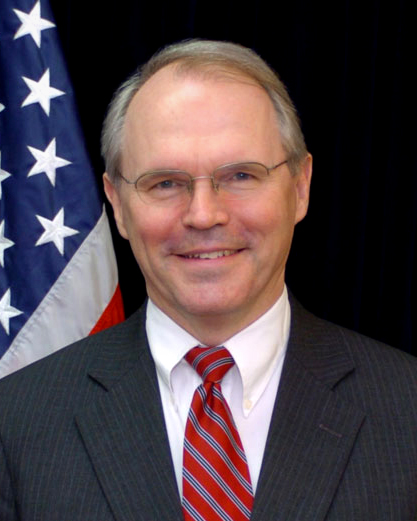
Assistant Secretary of State Christopher Hill. He became Ambassador to Iraq in March 2009.

After Hill, Campbell became Assistant Secretary of State, and the U.S. pivot to the Pacific began. Japan's involvement was also pushed by this momentum, or I would like to say that pushed their momentum.
The Micronesian Maritime Security Project, launched in 2008, was really a one-woman operation, so the only people who knew the details were myself and Jiro Hanyu, then Chairman of the Sasakawa Peace Foundation, to whom I had been reporting on progress.
Mr. Hanyu left the Foundation suddenly, really suddenly, in the fall of 2016. I was told that this was due to the fact that he had started a strange project regarding the protection of fishery resources.
He said to me,
"You, who are good friends with someone at the Fisheries Agency (referring to the former deputy director general, Masanori Miyahara), are not allowed in. The Nippon Foundation is going to give me billions of yen. You must be jealous.”
He told me in the spring of the same year. Oh, this is what Japanese bureaucrats and graduates of Tokyo University look like. What a pity. I was more worried than envious that I would be forced to clean up their mess again.
The project was abandoned. Mr. Hanyu, who had specialized in aviation issues at the Ministry of Transport, knew nothing about oceans or fisheries. The experts who were approached were apparently at a loss when Hanyu suddenly disappeared.
Anyway, Mr. Hanyu, who knew about the Micronesian maritime security project, was no longer there. I had no choice but to write about it, and I, who had been working on the ground, knew more about it than he did.
My memory came flooding back, and it was thirteen years ago. Before I write about the reaction of the Australian government, I would like to write about the reaction of the US government.
At the 8th Micronesian Presidential Summit held in the Federated States of Micronesia in November 2008, a request was made for Japan's assistance in maritime security. But again, the three Micronesian nations had signed a free association agreement with the United States, and their security was under the umbrella of the United States. In order for the project to proceed smoothly, the U.S.'s approval was necessary.
After the summit meeting we discussed the matter with the secretariat and decided to adjust the final minutes. This is the most delicate and nerve-wracking work. The other party was an American lawyer.
”We would like to express our sincere appreciation for the outcome of this meeting. By the way, do you think the U.S. government would approve of the request by the Presidents of the three Micronesian nations to Japan for cooperation on maritime security?”
"It's the decision of a sovereign nations."
"I'm well aware of that, but I understand that security is under the control of the United States. Shouldn't we inform the U.S. about this?"
I remember the moment when the lawyer looked me straight in the face and replied in a sullen and nasty way.
"All right! Lets get a letter to the US government from the Presidents of the three Micronesian countries!"
From the presidents? I was speechless with surprise and at the same time I thought to myself, "Okay! I thought to myself. Afterwards, we had a launch party at the hotel restaurant, and I remember he bought me a gin and tonic.
The Presidents of the three Micronesian countries sent a letter to the U.S. State Department.
This was the moment when a small country could move a large country. In some cases, the letter was ignored, but in other cases, it worked. The reply came about a month later from then Assistant Secretary of State Christopher Hill to Chairman Jiro Hanyu. I did not tell Mr. Hanyu that it is the result of my arrangement. It would hurt his pride of a high-ranking bureaucrat from Tokyo University to know that I had made another move.
So I told him,
"I heard something about a letter from the Presidents to the U.S. government."
I didn't tell him that I had suggested it. Besides, I didn't know if the President of Micronesia would actually send a letter.
If it were the Ministry of Foreign Affairs, such a letter would have been recorded as an official document, but it would have disappeared somewhere. Assistant Secretary of State Hill sent a sarcastic note.
"Japan's maritime surveillance activities? The Japanese fishing boat XXX was caught just the other day. Good luck with that."
That's what it said.
I was not happy, but the Ministry of Land, Infrastructure, Transport and Tourism official who was present with Mr. Hanyu, were thrilled. This is a Japanese boy, I thought pathetically.
At any rate, at this moment, Japan was given the go-ahead to support maritime security projects in the three Micronesian countries, which are in the lap of the United States.
However, Australia did not remain silent. The result was a 180-degree turnaround in Australia's maritime security policy.